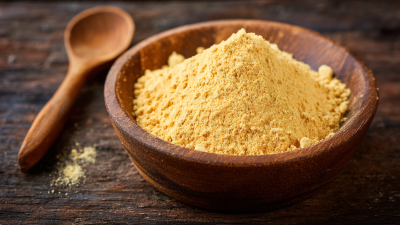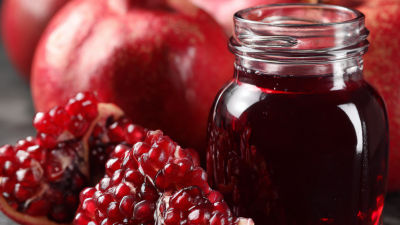7 Unique Benefits of Berberis Extract and Berberine HCl You've Never Heard Of
Berberis Extract and Berberine HCl have garnered increasing attention in the wellness community for their remarkable health benefits. These natural compounds, derived from the Berberis plant, contain bioactive alkaloids that are known to support various bodily functions, as detailed in a 2021 report by the National Institutes of Health, which emphasizes their potential in cardiovascular health and metabolic regulation.
With an estimated 80% of people worldwide relying on plant-based medicines as primary healthcare (World Health Organization, 2020), understanding the unique advantages of Berberis Extract and Berberine HCl becomes essential. This ultimate guide will uncover seven unique benefits of these powerful extracts that you may have never heard of before, illuminating their role in promoting overall health and well-being.
Unique Antimicrobial Properties of Berberis Extract and Berberine HCl
Berberis extract and its key compound, berberine HCl, have garnered attention for their unique antimicrobial properties that set them apart in the realm of natural supplements. Recent studies highlight berberine's efficacy against a wide spectrum of pathogens, including bacteria, fungi, and viruses. For instance, a study published in the journal Frontiers in Microbiology revealed that berberine significantly inhibited the growth of various drug-resistant bacterial strains, showcasing its potential as a natural alternative to conventional antibiotics.
Incorporating berberis extract into your health regimen may offer remarkable benefits. For those looking to boost their immune defense, a recent analysis shows that berberine not only combats harmful microorganisms but also promotes beneficial gut bacteria, thus enhancing overall gut health. Commit to a balanced diet rich in antioxidants by adding berberis-containing foods or supplements to your daily routine.
Tips: When selecting a berberine supplement, look for products with a standardized amount of berberine HCl for optimal potency. Additionally, consult with a healthcare professional for personalized advice, especially if you are taking other medications, to ensure safe and effective use.
Enhancing Gut Health: The Role of Berberine in Digestive Wellness
Berberine, derived from the Barberry plant, is gaining recognition for its remarkable impact on gut health. A recent study published in the Journal of Clinical Gastroenterology highlighted that berberine can significantly enhance the composition of gut microbiota, promoting the proliferation of beneficial bacteria while inhibiting harmful strains. This microbiome modulation is crucial; a balanced gut flora is linked to improved digestive function and overall health.
Moreover, berberine has demonstrated potential in managing conditions like irritable bowel syndrome (IBS), with surveys indicating approximately 60% of IBS patients report symptom relief upon incorporating berberine into their regimen.
In addition to its microbiome benefits, berberine exhibits strong anti-inflammatory properties. Research published in Phytotherapy Research indicates that berberine can reduce inflammatory markers in the gut, aiding in the treatment of chronic digestive conditions. This is particularly important as chronic inflammation can lead to serious complications like leaky gut syndrome.
Furthermore, a clinical trial reported in BMC Complementary Medicine and Therapies showed that patients supplementing with berberine experienced a 25% reduction in gut inflammation over eight weeks. With these compelling findings, berberine emerges as a powerful ally in supporting digestive wellness and enhancing overall gut health.
Berberine and Blood Sugar Regulation: A Surprising Connection
Berberine, a bioactive compound found in the Berberis family, has gained attention for its impressive role in blood sugar regulation. Recent research highlights a surprising synergy with dietary interventions, such as the inclusion of goat milk, which has shown promise in improving glucose metabolism and pancreatic beta-cell function in diabetic models. This connection underscores the potential for natural supplements like berberine to work alongside dietary strategies to enhance metabolic health.
As scientists explore the multifaceted benefits of berberine, its impact on managing blood sugar levels becomes increasingly evident. Not only does berberine help to lower blood glucose, but it may also support insulin sensitivity, making it a valuable tool for those looking to maintain healthy blood sugar levels. The findings surrounding goat milk's effects on metabolism suggest that a holistic approach combining lifestyle changes with natural extracts like berberine could offer a novel pathway for diabetes management.

Promoting Heart Health: Benefits of Berberis Extract for Cardiovascular Support
Berberis extract, particularly its active compound berberine HCl, has gained attention for its remarkable benefits in promoting heart health. Research indicates that berberine can significantly lower cholesterol levels by up to 25%, as stated in a meta-analysis published in the Journal of Clinical Lipidology. This reduction in cholesterol not only helps maintain optimal heart function but also plays a critical role in preventing the development of cardiovascular diseases. In particular, the ability of berberine to modulate lipid metabolism demonstrates its potential as a natural therapeutic agent for individuals at risk of heart-related issues.

Moreover, berberine's anti-inflammatory properties further enhance cardiovascular support by reducing pro-inflammatory markers in the bloodstream. According to a study published in Nutrition Reviews, berberine supplementation resulted in notable decreases in C-reactive protein (CRP) levels, a key indicator of inflammation linked to heart disease. This dual action—lowering cholesterol and curbing inflammation—positions berberis extract as a compelling option for those seeking to bolster their heart health through natural means. As awareness of these benefits spreads, more individuals are turning to plant-based solutions for maintaining cardiovascular wellness.
Unveiling Berberine’s Potential in Weight Management and Metabolic Boosting
Berberine, derived from the Berberis plant, is gaining attention for its impressive potential in weight management and enhancing metabolic health. One of its primary benefits lies in its ability to improve insulin sensitivity. By promoting better glucose uptake in cells, berberine helps regulate blood sugar levels, which can be a crucial factor for those struggling with weight loss. This regulation not only aids in shedding excess pounds but also fosters a stable energy level throughout the day, minimizing the energy crashes often associated with calorie restriction.
Furthermore, berberine is known to influence lipid metabolism positively. Studies have shown that it can reduce total cholesterol and triglyceride levels, promoting a healthier lipid profile. This impact on fat metabolism means that incorporating berberine into one’s routine could not only support weight management efforts but also contribute to overall cardiovascular health. As more individuals look for natural solutions to assist with their weight loss journeys, berberine emerges as a powerful ally, offering a unique blend of metabolic benefits that extend beyond traditional dietary changes.
7 Unique Benefits of Berberis Extract and Berberine HCl You've Never Heard Of
| Benefit |
Description |
Research Findings |
| Weight Management |
May help reduce body fat and support weight loss. |
Studies show berberine can promote fat metabolism in overweight individuals. |
| Metabolic Health |
Supports healthy blood sugar levels and lipid profiles. |
Clinical trials indicate significant improvements in HbA1c and cholesterol levels. |
| Anti-Inflammatory Effects |
Might reduce inflammation markers in the body. |
Research highlights its potential to lower inflammatory cytokines. |
| Gut Health |
Can promote a healthy gut microbiome. |
Studies suggest berberine may enhance gut flora diversity. |
| Antioxidant Properties |
Offers protection against oxidative stress. |
Research indicates berberine can scavenge free radicals effectively. |
| Cardiovascular Support |
May improve heart health and circulation. |
Clinical evidence shows benefits in reducing blood pressure. |
| Cognitive Function |
Potentially enhances memory and brain health. |
Animal studies suggest neuroprotective effects. |

About Us
Products
Nutraceuticals
Botanical Extracts
Berberis Extract
Ginkgo Biloba Extract
Rutin
Quercetin
Grape Seed Extract
European Bilberry Extract
Broccoli Seed Extract
Fisetin
Ajuga Extract
Resveratrol
Stevia Leaf Extract
Green Tea Extract
Olive Leaf Extract
Epimedium Extract
Rhodiola Rosea Extract
Panax Ginseng Extract
Pomegranate Extract
Garlic Extract
Milk Thistle Extract
Black Pepper Extract
Fruit & Vegetable Juice Powder
Customized Service
News
Blog
Contact Us








